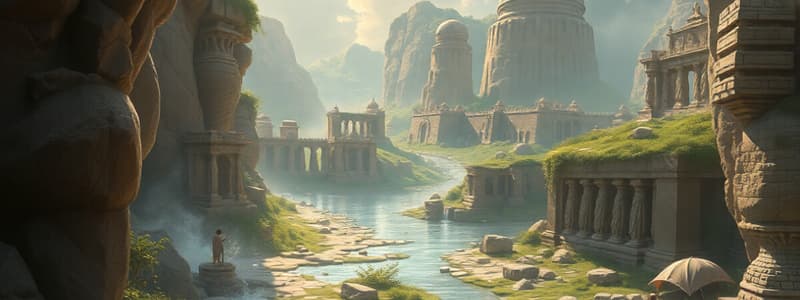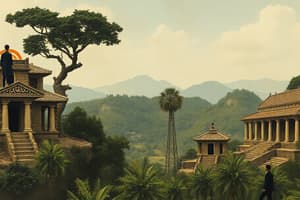Podcast
Questions and Answers
What was a significant factor that contributed to the collapse of Uruk around 5,200 to 5,000 years ago?
What was a significant factor that contributed to the collapse of Uruk around 5,200 to 5,000 years ago?
- Technological stagnation in irrigation methods
- A relentless drought affecting agricultural output (correct)
- Overpopulation leading to resource depletion
- Invasion by neighboring civilizations
What event is believed to have caused the abandonment of Mohenjo-daro around 3,900 years ago?
What event is believed to have caused the abandonment of Mohenjo-daro around 3,900 years ago?
- Internal political strife and social unrest
- Natural disasters such as earthquakes
- Invading forces from the north
- Drastic environmental changes leading to resource scarcity (correct)
How did the Maya civilization respond to the prolonged drought discussed in Chapter 12?
How did the Maya civilization respond to the prolonged drought discussed in Chapter 12?
- They completely abandoned all cities and returned to nomadic lifestyles
- They adapted their agricultural practices to cope with the drought (correct)
- They experienced a sudden technological advancement in irrigation
- They initiated warfare to seize resources from neighboring regions
What archaeological evidence suggests that the Moche civilization faced severe environmental challenges?
What archaeological evidence suggests that the Moche civilization faced severe environmental challenges?
Why is the study of ancient civilizations and their environmental challenges important for understanding modern society?
Why is the study of ancient civilizations and their environmental challenges important for understanding modern society?
What was one way the Moche society responded to the onset of aridity?
What was one way the Moche society responded to the onset of aridity?
What is the estimated increase in global sea level by the year 2100 according to the consensus?
What is the estimated increase in global sea level by the year 2100 according to the consensus?
What does the term 'collapse' refer to in the context of societal responses to existential threats?
What does the term 'collapse' refer to in the context of societal responses to existential threats?
How many people in the United States live in coastal areas that would be inundated if sea levels rise by 120 cm?
How many people in the United States live in coastal areas that would be inundated if sea levels rise by 120 cm?
What is a key factor challenging predictions about future sea level changes?
What is a key factor challenging predictions about future sea level changes?
What unusual sacrificial request was made by God to Abraham in Genesis 22?
What unusual sacrificial request was made by God to Abraham in Genesis 22?
How were some children prepared for sacrifices in the Andes?
How were some children prepared for sacrifices in the Andes?
In discussions about the potential shift of economic power, which scenario was outlined?
In discussions about the potential shift of economic power, which scenario was outlined?
What aspects are ancient and modern societies believed to address when facing challenges?
What aspects are ancient and modern societies believed to address when facing challenges?
What dramatic change in lifestyle does the text indicate may happen with a rise in sea levels?
What dramatic change in lifestyle does the text indicate may happen with a rise in sea levels?
Flashcards
Collapse of Ancient Civilizations
Collapse of Ancient Civilizations
Ancient civilizations often experienced collapse or contraction due to interconnected environmental downturns, especially severe droughts that disrupted agricultural systems.
Uruk Civilization Collapse
Uruk Civilization Collapse
The Mesopotamian city of Uruk, a significant early urban center, collapsed around 5,200-5,000 years ago due to a severe drought.
Indus Valley Civilization Impact
Indus Valley Civilization Impact
A drought around 3,900 years ago possibly significantly impacted the Indus Valley civilization, leading to the abandonment of Mohenjo-daro and the surrounding communities.
Moche Civilization Abandonment
Moche Civilization Abandonment
Signup and view all the flashcards
Agricultural Disruption & Civilization
Agricultural Disruption & Civilization
Signup and view all the flashcards
Moche society's response to drought
Moche society's response to drought
Signup and view all the flashcards
Modern sea level rise
Modern sea level rise
Signup and view all the flashcards
Civilizational collapse
Civilizational collapse
Signup and view all the flashcards
Human sacrifice in ancient societies
Human sacrifice in ancient societies
Signup and view all the flashcards
Ayahuasca use in the Andes
Ayahuasca use in the Andes
Signup and view all the flashcards
Abraham's sacrifice in the Bible
Abraham's sacrifice in the Bible
Signup and view all the flashcards
Ancient societies' response to environmental challenges
Ancient societies' response to environmental challenges
Signup and view all the flashcards
Challenges faced by modern societies
Challenges faced by modern societies
Signup and view all the flashcards
Societal adaptation
Societal adaptation
Signup and view all the flashcards
Predicting sea level rise
Predicting sea level rise
Signup and view all the flashcards
Study Notes
Ancient Civilization Collapses and Societal Responses
- Ancient civilizations, like Uruk (Mesopotamia), experienced collapses linked to environmental downturns.
- Uruk's collapse, around 5,200-5,000 years ago, coincided with a severe drought, evidenced by increased dust in the Gulf of Oman.
- The Indus Valley civilization, around 3,900 years ago, also faced a likely drought, leading to the abandonment of Mohenjo-daro.
- The Maya, Moche, and others demonstrated resilience, not complete collapse, in response to environmental challenges.
- The Moche, facing drought, shifted to more water-reliable inland locations, instead of perishing.
Modern Civilization's Potential Response to Environmental Disruptions
- Global sea level has risen by about 20 cm (8 inches) since the late 1800s.
- Scientific consensus projects a further 30-120 cm (12-48 inches) rise by 2100, affecting millions in coastal regions.
- Agricultural lands may become less productive due to climate change and shifting precipitation patterns.
- Increased nuclear stockpiles could lead to a more perilous global landscape.
- Economic shifts, from poor nations becoming wealthy and wealthy nations becoming poor, could cause considerable repercussions.
Ancient Societal Responses and "Collapse"
- Societal responses to challenges, both ancient and modern, involve adjustments to maintain survival.
- A "collapse" often refers to a major shift in culture, not necessarily an extinct community.
- The act of sacrificing children, especially for religious reasons, is an extreme strategy that may stem from desperation.
The Chimu and Mass Child Sacrifice
- The Chimu civilization, in pre-Inka Peru, performed mass child sacrifice at Huanchaquito-Las Llamas (~550 years ago).
- Over 140 children, aged 5-14, and 200 young llamas were ritually sacrificed.
- Analysis shows the children were ritually killed and their hearts removed. The bodies were situated facing a given direction.
- This practice may have stemmed from environmental devastation, a severe El Niño event and subsequent catastrophic flooding.
- Their extreme reaction suggests a desperate response to severe environmental disruption, impacting marine fisheries.
Human Sacrifice: A Different Perspective
- Ancient state societies, like the Shang and Aztecs, practiced ritual human sacrifice.
- Most victims were adults, a clear contrast to the Chimu cases, where children were the primary target.
- Child sacrifice in these instances was often a complex ceremony, with victims prepared for the ritual, although suffering.
- Children might be drugged, particularly in instances such as the example of the 4-year-old girl and the 8-year-old boy found in southern Peru.
Studying That Suits You
Use AI to generate personalized quizzes and flashcards to suit your learning preferences.




